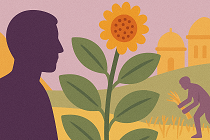
HEB/HIST/GSCI 310 - Plants, People & Civilization
This course explores the deep connection between human societies and the plant world throughout history. This course examines how plants have shaped human evolution, culture, and technology, from ancient agricultural practices to modern-day global industries. Students will investigate the biology of key plant species, exploring their role in food production, medicine, and environmental sustainability. The course delves into the evolutionary history of plants and how they have adapted to diverse ecosystems, as well as how humans have influenced plant development through domestication and selective breeding. We’ll use a number of examples from the deep history of Italy but topics will include the origins of agriculture, the impact of plant-based resources on trade and economies, and the role of plants in shaping human diets and medicine. While rooted in biological concepts, the course is designed for students with an interest in the cultural, historical, and ecological aspects of plants, rather than in laboratory-based science.
Learning Outcomes and Assessment Measures
By the end of this course, students will be able to:
- Identify key plant traits that facilitated domestication and their evolutionary significance;
- Describe the genetic, ecological, and human-driven factors that shaped the development of major domesticated crops;
- Summarize the process of coevolution between humans and plants, including mutualisms and trade-offs in plant-animal interactions;
- Compare different regional domestication events and their biological underpinnings, such as those in the Fertile Crescent, Mesoamerica, and East Asia;
- Analyze how specific plant species influenced human population dynamics, migration, and the formation of early agricultural societies;
- Interpret primary scientific literature in evolutionary biology related to crop domestication, plant-animal interactions, and botanical adaptations;
- Integrate evolutionary theory with archaeological and genetic evidence to explain how plants shaped the biological and cultural trajectory of human history.

